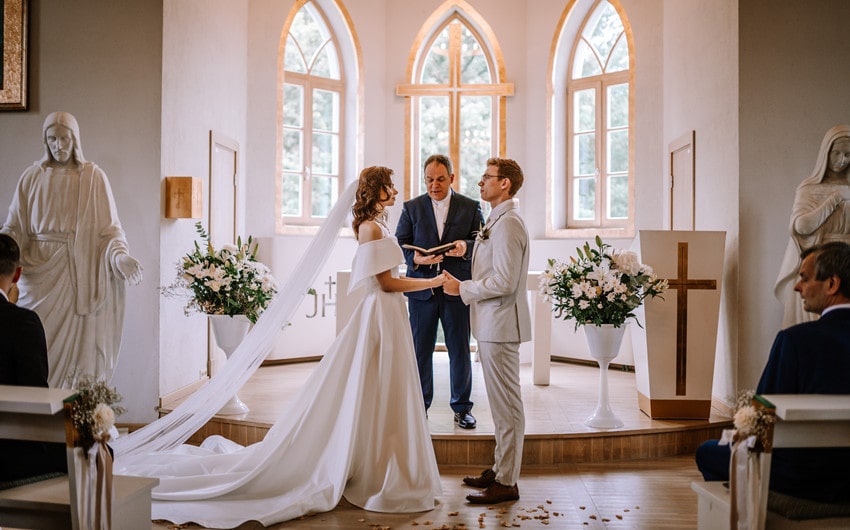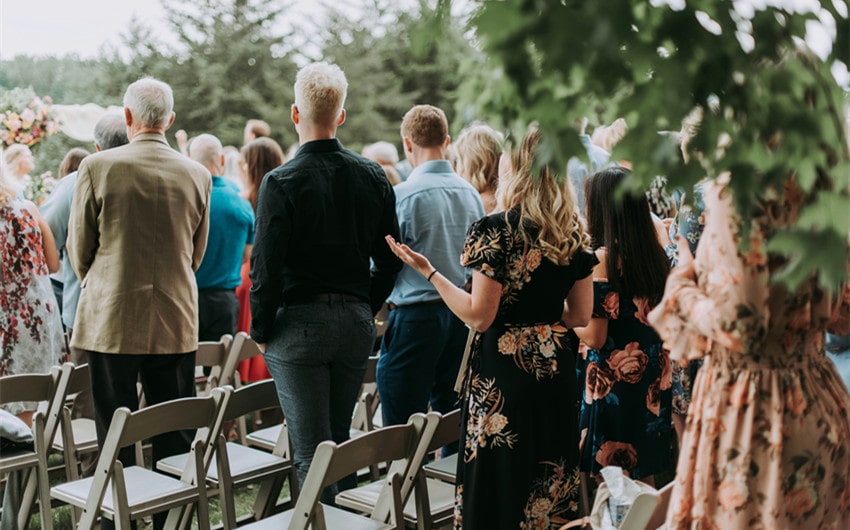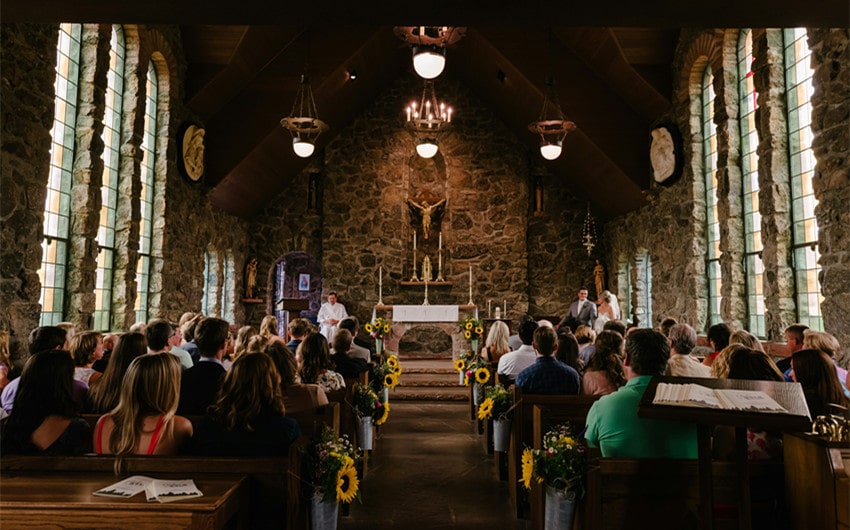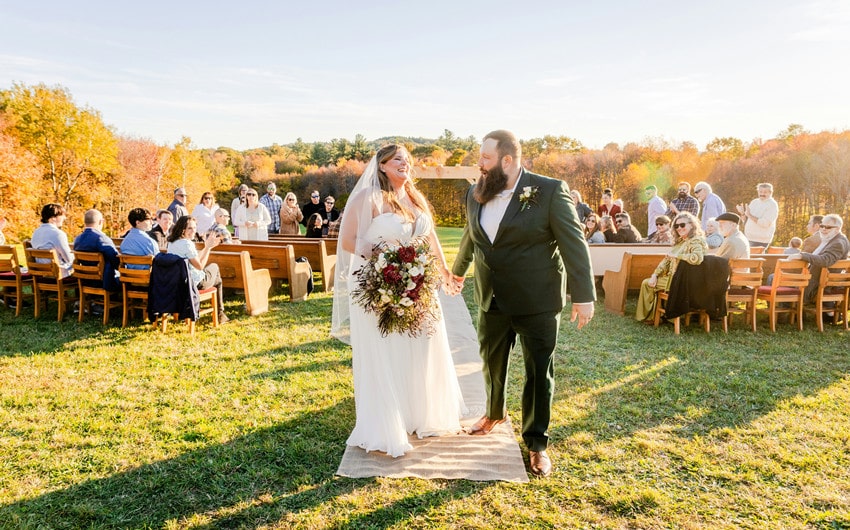Wedding Ceremony Script Ideas to Make Your Day Memorable
Your wedding day is one of the most memorable moments of your life, and the ceremony sets the tone for everything that follows. A thoughtful and personalized wedding ceremony script can transform this special occasion into an unforgettable celebration of your love story.
Whether you’re planning a traditional ceremony or something uniquely your own, having a clear script ensures everything flows smoothly and reflects your personalities. From heartfelt vows to joyful pronouncements, the right words bring meaning to every part of the event. Let’s explore how you can craft a script that makes your ceremony truly one-of-a-kind.
What Is a Wedding Ceremony Script?
A wedding ceremony script is the detailed outline of everything said and done during the ceremony. It serves as a guide for the officiant, ensuring that the event flows smoothly and includes all the key elements of a wedding, such as the vows, ring exchange, and pronouncement of marriage. The script acts as both a roadmap and a way to bring structure to what can be an emotional and overwhelming moment, allowing everyone involved to focus on the significance of the day without worrying about what comes next.
Beyond logistics, a wedding ceremony script captures the essence of the couple’s journey and sets the tone for the celebration. Whether it’s traditional, religious, secular, or fully customized, the script reflects the couple’s values, personalities, and shared love story. It can include everything from personal anecdotes and meaningful readings to lighthearted moments that bring joy and laughter. By carefully crafting a script that resonates with the couple and their guests, the ceremony becomes a truly memorable experience for all.
Key Elements of a Wedding Ceremony Script
1. Welcome and Opening Remarks
The ceremony begins with a warm welcome from the officiant, setting the tone for the event. This includes greeting the guests, expressing gratitude for their presence, and creating a sense of intimacy. The officiant may also share a brief reflection on the significance of the day and the meaning of marriage, helping everyone feel connected to the moment. This opening is the perfect opportunity to establish the ceremony’s vibe, whether it’s formal, relaxed, or somewhere in between.
2. The Couple’s Story
Incorporating the couple’s unique love story is a heartwarming way to personalize the ceremony. The officiant may share anecdotes about how the couple met, their journey together, or what makes their relationship special. This section is often emotional and serves as a reminder of why everyone has gathered to celebrate. Highlighting these moments not only makes the ceremony more meaningful but also allows the guests to feel more connected to the couple.
3. Readings or Poems
Many couples choose to include meaningful readings, poems, or even song lyrics in their ceremony. These can be delivered by the officiant or selected guests, adding an extra layer of personalization. Whether it’s a classic literary piece, a spiritual passage, or something modern and quirky, the reading should resonate with the couple and complement the overall theme of the ceremony. It’s a beautiful way to reflect on love and commitment.
4. Exchange of Vows
The vows are often the emotional centerpiece of the ceremony. This is where the couple expresses their promises and commitments to each other. Vows can be traditional, following time-honored phrasing, or entirely personal, crafted by the couple to reflect their unique relationship. Some couples opt for a mix of both, adding personal touches to classic wording. This moment is deeply intimate and serves as a powerful reminder of the love and dedication at the heart of the day.
5. Rings Exchange
The exchange of rings is a symbolic tradition that represents the couple’s unending commitment to one another. The officiant typically explains the significance of the rings before the couple places them on each other’s fingers. This act is often accompanied by a short script, such as, “With this ring, I thee wed,” or personalized phrases chosen by the couple. The simplicity and beauty of this tradition make it one of the most cherished moments of the ceremony.
6. Pronouncement and Kiss
This is the climactic moment when the officiant declares the couple officially married. The wording can vary, from the classic “By the power vested in me…” to something more personalized, depending on the tone of the ceremony. The pronouncement is often followed by the much-anticipated first kiss as a married couple, marking the start of their life together. This joyous moment is usually met with cheers and applause from guests.
7. Closing Remarks and Exit
The ceremony concludes with final words from the officiant, often offering well wishes for the couple’s future. The officiant might also give practical instructions for the guests, such as where to go for the reception. The newlyweds then make their grand exit, often accompanied by celebratory music and applause. This joyful conclusion leaves a lasting impression, setting the stage for the celebrations to come.
Customizing a Wedding Ceremony Script
Customizing a wedding ceremony script allows couples to create a truly unique and personal celebration that reflects their love story, values, and personalities. It’s an opportunity to break away from traditional formats or incorporate meaningful elements that hold special significance for the couple. Whether you want a romantic, humorous, or deeply spiritual tone, tailoring the script ensures the ceremony feels authentic and memorable.
1. Adding Personal Touches
One of the easiest ways to customize your wedding ceremony script is by including personal touches. Share stories that highlight your journey as a couple, such as how you met, your first date, or memorable milestones. You can also add inside jokes or references to shared hobbies and interests. These personal elements make the ceremony more intimate and engaging for both the couple and their guests, creating a celebration that truly reflects who you are.
2. Incorporating Cultural or Religious Traditions
If you come from different cultural or religious backgrounds, blending these traditions into the ceremony can make it even more meaningful. This might include specific rituals, prayers, or symbolic acts, such as a unity candle, handfasting, or breaking the glass. By incorporating elements from each partner’s heritage, you honor your families and create a beautiful fusion of traditions that celebrates your unique union.
3. Using Meaningful Readings or Music
Adding readings, poems, or song lyrics that resonate with your relationship is another way to customize the ceremony. Choose pieces that reflect your love story, values, or aspirations as a couple. These can be read by the officiant, close friends, or family members. Similarly, music is a powerful way to set the mood—select songs that are meaningful to your relationship for the processional, recessional, or special moments during the ceremony.
4. Personalizing Your Vows
Customizing your vows is a deeply personal way to make the ceremony unique. Writing your own promises allows you to express your love, commitment, and hopes for the future in your own words. If traditional vows are preferred, you can still personalize them by adding a heartfelt message before or after the standard phrasing. This ensures that your vows reflect your true feelings and leave a lasting impact.
5. Balancing Humor and Emotion
A great wedding ceremony script strikes a balance between humor and heartfelt emotion. Lighthearted moments, such as a funny anecdote or playful vows, can help ease nervousness and create a relaxed atmosphere. At the same time, including emotional elements ensures the ceremony remains meaningful and sincere. Discussing the tone you want with your officiant can help strike the perfect balance.
6. Acknowledging Special People
Customize your ceremony by acknowledging important people in your lives, such as parents, grandparents, or close friends. This could be through a special mention in the script, a tribute to loved ones who have passed away, or inviting certain guests to participate in the ceremony by reading or performing a ritual. Recognizing these relationships adds depth and sentiment to your big day.
7. Creating a Flow That Feels Right
When customizing your wedding ceremony script, think about the flow and pacing of the event. You don’t have to stick to a traditional order of events. For example, you might choose to start with a shared activity, such as writing love letters to open on your anniversary, or end with a group blessing. A well-thought-out sequence ensures the ceremony feels natural and reflects your personalities.
Sample Wedding Ceremony Scripts
Providing sample wedding ceremony scripts can serve as inspiration for couples looking to craft their own or adapt an existing format. Whether you prefer a traditional, non-religious, short, or fun ceremony, there’s a style that can match your vision. Below are examples of commonly used wedding ceremony scripts, each tailored to different preferences.
1. Traditional Ceremony Script Example
A traditional wedding ceremony script follows a classic structure with formal language and timeless elements. This script includes a welcoming statement, readings or prayers, vows, and the exchange of rings. For instance:
- Opening Remarks: “Dearly beloved, we are gathered here today to witness and celebrate the union of [Partner 1] and [Partner 2] in marriage.”
- The Couple’s Story or Readings: Share a meaningful biblical passage or quote that reflects the couple’s commitment.
- Vows and Ring Exchange: Use traditional phrases like, “With this ring, I thee wed.”
- Pronouncement: End with the iconic line, “By the power vested in me, I now pronounce you husband and wife.”
This structure appeals to couples who want a formal and elegant ceremony with a timeless feel.
2. Non-Religious Ceremony Script Example
For couples who want a ceremony without religious elements, a non-religious script focuses on love, commitment, and personal connection. It might include:
- Welcome: “Welcome, friends and family, to this celebration of love and partnership between [Partner 1] and [Partner 2].”
- Personalized Vows: The couple exchanges self-written vows expressing their love and promises.
- Rings Exchange: “These rings symbolize the unending circle of your love and commitment.”
- Closing Remarks: Conclude with, “May your days together be filled with love and joy.”
This script provides flexibility, allowing the couple to include readings, songs, or rituals that resonate with them personally.
3. Short and Sweet Ceremony Script Example
For those who prefer a concise ceremony, a short and sweet script is ideal. This format is often used for elopements or intimate weddings:
- Opening Words: “We are gathered here today to join [Partner 1] and [Partner 2] in marriage.”
- Quick Vows: The officiant prompts the couple with simple “I do” statements.
- Rings Exchange: “Please place this ring on [Partner’s name]’s finger as a symbol of your love.”
- Pronouncement and Kiss: The officiant declares them married and invites them to kiss.
This option keeps things simple while maintaining the core elements of a wedding ceremony.
4. Fun and Casual Ceremony Script Example
For couples who want a relaxed, lighthearted atmosphere, a fun and casual script can add humor and personality to the ceremony:
- Opening: “Welcome, everyone! Today we’re here to celebrate the fact that [Partner 1] and [Partner 2] have decided to make it official.”
- The Couple’s Story: Include a humorous anecdote about their relationship or how they met.
- Vows: The couple might share quirky promises, such as, “I promise to let you have the last slice of pizza.”
- Rings Exchange: Add a playful touch, like, “These rings are shiny reminders of the commitment you’re making—just don’t lose them!”
- Pronouncement: “By the power vested in me and a little help from the internet, I now pronounce you married!”
This script keeps guests entertained while celebrating the couple’s love in a personal, fun way.
Common Mistakes to Avoid
Planning a wedding ceremony script requires careful thought and attention to detail. Overlooking key elements or making simple missteps can disrupt the flow and impact the overall experience. Here are some common mistakes to avoid when crafting your script, ensuring your ceremony is as seamless and memorable as possible.
1. Overloading the Script with Lengthy Speeches
While heartfelt words are essential, overly long speeches or readings can make the ceremony feel tedious for guests. It’s important to strike a balance between meaningful content and brevity. Keep personal anecdotes and reflections concise, focusing on the highlights of your love story or key sentiments. Aim for a ceremony duration that respects your guests’ attention spans, typically around 20-30 minutes. Editing down overly elaborate sections ensures the ceremony flows smoothly and holds everyone’s interest.
2. Forgetting to Include Legal Components
One of the most critical aspects of a wedding ceremony is ensuring it fulfills the legal requirements for marriage. Forgetting to include components like the declaration of intent (“Do you take this person to be your spouse?”) or the officiant’s pronouncement can result in an invalid marriage. Double-check the legal requirements for your location and ensure your officiant includes these elements in the script. It’s also wise to confirm that your officiant is legally authorized to perform marriages in your area.
3. Ignoring the Flow and Pacing of the Ceremony
A disjointed or poorly paced ceremony can leave guests confused or disengaged. Avoid abrupt transitions or gaps where no one knows what’s happening next. Ensure the script follows a logical sequence, such as opening remarks, vows, rings exchange, and closing statements. Practice the script with your officiant and wedding party to identify any awkward moments and refine the flow. Smooth pacing ensures the ceremony feels cohesive and enjoyable for everyone involved.
4. Overlooking Audience Engagement
The ceremony isn’t just for the couple—it’s also a shared experience with family and friends. Avoid making it overly self-focused or neglecting the guests’ perspective. Include moments that acknowledge their presence, such as a welcome statement or a communal activity like a group blessing or sing-along. Engaging your audience creates a warm, inclusive atmosphere that enhances the celebration for everyone.
5. Relying Too Much on Clichés
While traditional elements have their charm, relying too heavily on clichés can make your ceremony feel generic. Avoid overly used phrases or predictable anecdotes that lack personal connection. Instead, focus on crafting a script that reflects your unique relationship. Incorporate personal stories, inside jokes, or meaningful references that make the ceremony distinctly yours.
6. Neglecting to Prepare for Unplanned Moments
Unexpected events can occur during a ceremony, from a baby crying to a gust of wind blowing away papers. Failing to plan for these moments can add stress or disrupt the proceedings. Work with your officiant to include contingency plans, such as having backup copies of the script or taking a lighthearted approach to interruptions. Flexibility and humor can turn minor mishaps into memorable moments.
7. Skipping a Rehearsal
One of the biggest mistakes couples make is skipping a rehearsal for the ceremony. Practicing the script allows everyone involved—officiant, wedding party, and even the couple—to familiarize themselves with the flow and timing. A rehearsal helps identify and resolve potential issues, such as unclear instructions or awkward transitions, before the big day. Don’t underestimate the importance of this step in ensuring a flawless ceremony.










